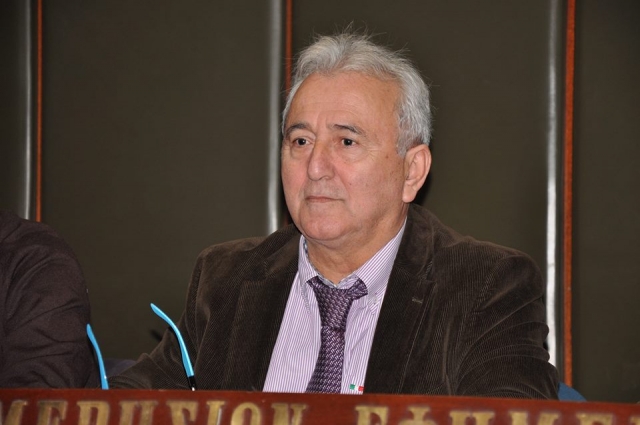Photo: kathimerini.gr
Anastasia Balezdrova
A heavy shootout between the police forces and members of an "armed group" in Kumanovo a week ago killed 22 people and injured 37. The town is located near Macedonia’s border with Serbia and Kosovo and is one of the places where the Albanian community has the strongest presence.
The events sparked violent developments inside the country, where the demand for Prime Minister Nikola Gruevski to resign is increasingly resounding. After last night's mass protest of the supporters of the opposition that ended with the formation of a protest camp outside the government building in Skopje, today the government organized a demonstration in its own support too.
Meanwhile, the Albanian community blames the events in Kumanovo on the police and the risk of Macedonia’s destabilization is very real, as stated by the analysts. One of them is Greek journalist Stavros Tzimas. As the correspondent for the newspaper Kathimerini, he has covered all military conflicts in the western Balkans over the last 25 years which he describes in his book "The breakup of Yugoslavia and the Greek illusions."
 In an interview with GRReporter Tzimas relates what he saw in Kumanovo during his visit there a few days after the bloody skirmish and how this could potentially destabilize the entire Balkan Peninsula.
In an interview with GRReporter Tzimas relates what he saw in Kumanovo during his visit there a few days after the bloody skirmish and how this could potentially destabilize the entire Balkan Peninsula.
Mr. Tzimas you returned from Kumanovo and Skopje a few days ago. Would you tell us what you saw and learnt there about the events?
There must have been a fierce gunfight there, namely in a 100-metre- long street where no stone remained unturned.
According to the available information, these people had arrived in Kumanovo some time ago and brought heavy weapons. They were equipped with bazookas, shells and heavy machine guns. It is unclear whether they had rented the houses where they had stayed or if some residents had sheltered them in their own houses.
Obviously, the police were aware of their presence in Kumanovo and organized the operation to eliminate them, this bloodshed being the result of it. It really was a massacre. Literally, there were shootings from room to room.
It is significant that the residents are not talking about the events. Only Albanians live in the neighbourhood where the houses there were illegally built. This is the "heart" of the Albanian community in FYROM, as 30 percent of Kumanovo’s residents are Albanians. Nobody answered my question as to who the people were who took part in the shootout with the police. All claimed that they had seen, heard or learnt nothing. And all this in a typical closed Albanian community in which everyone knows everything about everything. Moreover, they were adamant that they knew nothing about the arrival of the 70 heavily-armed outsiders. They said they knew nothing, but some of them had let out their houses to them or accommodated them free of charge.
This shows many things in my opinion, especially that there was an order for everyone to maintain absolute silence about the events and blame everything on the Macedonian police as they call them.
The second thing that made a significant impression on me was that this street, where 22 people were killed and whose blood was still there, had turned into a tourist attraction. People from the surrounding villages and probably elsewhere went there, including women and small children, took selfies and smiled, and the locals even showed them around and described the events to them. I was surprised by the fact that the police had not closed off the area to investigate what had happened and to gather further evidence.
This is what I saw on the site of the shootout. In addition, I spoke with Kumanovo's mayor who is a member of the opposition Social Democratic Union of FYROM and I think it is the only mayor's position won by the opposition in the entire country. He attacked Prime Minister Nikola Gruevski but said he had no specific opinion on what exactly had happened.
At the end of my journey and after talks with foreign and local diplomats, observers, analysts and other officials in Kumanovo and Skopje, I could not understand the reasons for this bloodshed.
Many varied scenarios are commented on in FYROM, depending on the perspective and interests of each side. There is a view that the case was a provocation organized by the government to distract the public from the dramatic turn of the phone tapping scandal and the political crisis. Personally, I doubt very much that this was so, not because I think the secret service would not do such a thing but because it is out of all proportion to cause such bloodshed on such an occasion.
Another scenario that is under consideration suggests that it was a criminal offense. It is believed that, because the Kumanovo region is a crossroads of trafficking in various commodities, the case could have involved drug traffickers, etc. Although this scenario is not to be rejected, it seems excessive. If this were the case, why would the armed men be in UCK uniforms?
The efforts by the international community, the Albanian leaders and, recently, by the government in Skopje to denationalize what has happened are particularly impressive. Because there are already talks, though still subdued, that armed groups of new extreme Albanian nationalists have been out in the mountains.